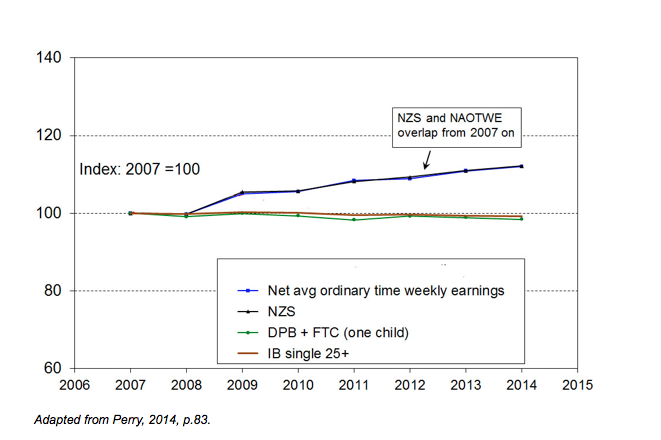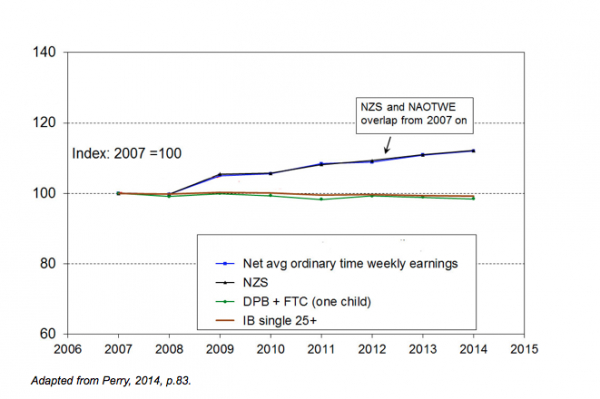This week a delighted – and no doubt relieved – Minister of Social Development gave us the news we had all been waiting for: under her careful watch, child poverty has fallen 3%. The figures are in the latest Ministry of Social Development (MSD) report on household incomes. They also show, as Ms Bennett happily reports, that the median income of households increased 4% between 2011-2013. While the Minister acknowledged that ‘more needs to be done to support our most vulnerable families’, the key message is that ‘New Zealand households have bounced back’.
While this claim is consistent with the government’s good news story as it cranks up its election campaign, from the point of view of children in low-income households it must have an air of unreality as they watch their stressed and exhausted parent/s attend endless, pointless Work and Income appointments, or struggle to hold down multiple part-time jobs.
The economy might be bouncing back, if not streaking ahead, for some but, as has been observed elsewhere, the recovery is uneven and patchy, and is leaving those with the least even further behind. Alarmingly, although child poverty has fallen, the numbers in severe poverty (in households with an income of <40% of the median income after housing costs) now stands at 135,000, up 20,000 since 2007. The proportion of children in low-income households (<60% of the median after housing costs) who fall below the stringent 40% line is 52%, up from 48% in 2007. There are fewer poor children, but they are poorer, and likely to be in poverty longer. This is not good for them, it’s not good for the rest of us, but mostly it’s unjust and inequitable.
How has this happened? While there are a number of factors at play, a key villain is the low level of benefits. It’s not just that benefit levels are low, it is the fact that they are falling ever further behind wages, and this makes families especially vulnerable in places such as Auckland and Christchurch where they are also being squeezed by high housing costs.
The graph below is adapted from the MSD’s household incomes report and shows the relative levels of the net average wage, NZ Super and the benefit income of a sole parent with one dependent child. Two things stand out: the first is that although NZ Super is below the net average wage, it tracks it, keeping its relativity. In other words, we can protect the incomes of welfare recipients when we choose to. What happens when we choose not to is evident from the sole parent beneficiary incomes which have fallen by 2% ($2007) since 2007 while the net average wage has risen 5%. As incomes in sole parent beneficiary households fall further behind that of households earning the average wage, the proportion of children living below the extremely poor 40% line will continue to increase.
If there is anything we have learned in the last 10 years it is that while poverty itself has consequences for children across a range of outcomes, the size of the poverty gap also impacts on their physical, mental and emotional wellbeing. The longer those 135,000 children in severe poverty remain in straitened circumstances, the more likely the consequences will stay with them into adulthood.
The Minister is certainly correct when she notes more needs to be done to support these economically vulnerable families. But insulating state houses, throat swabs for rheumatic fever and free nit treatments are not solutions to child poverty. Much more needs to be done to directly increase the incomes of those at the very bottom. Having children sleeping in cars and garages, missing school to care for their siblings and not getting the medical attention they need is unconscionable. If the Minister thinks ‘more needs to be done’ then it is time for her to stop ignoring the elephant of inadequate benefit levels and do something.
Donna Wynd works at CPAG







That report is the result of surveying 5000 households, if I recall.
Scarcely a good statistical sample of NZ.
… Sorry, I meant to add that Paula Bennett’s use of the report to imply success for her policies is flawed, and was too quick to hit return.
I appreciated both the tone and content of the article, and heartened to see to renewal of information coming through in the media regarding poverty in NZ.
Paula Bennett’s girl scout bouncy announcement had an air of unreality about it, it just seemed a bit too contrived. Wage growth has been quite flat and has been so under Keys government yet the cost of rent for example has definitely seen strong growth.
5 years ago maybe she might have pulled this off and the majority may have believed her and her government but in 2014 the words “Official and Statistic” have become cogent similes for Pure Lies.
Excellent article Donna.Keep up the great work with CPAG.
Well said!
But what happens next?
I simply don’t believe a single word of what Bennet has said. There’ve been far too many cases of this shonkey government manipulating data to be taken seriously.
Wasn’t it Bennet who refused to do any sort of measurement to ascertain the true level’s of child poverty in this country? And now she’s crowing that stats show a drop in child poverty??
Based on what???
There are stuff all statistics to rely on.
These rightwing parasites have mislead us before. They’re doing it again.
Ever heard about keeping us in the dark and treating us like mushrooms.
It is not just families it is also single young people on benefits who has disabilities being screwed into the ground.
Just ask any single diabetic who is under 25 and see what responce they get from winz.
Petrol sky high – housing sky high by WORLD standards – and now we give you – Record Food Prices!!!! http://www.stuff.co.nz/national/10260101/Families-feel-bite-of-food-cost
End corporate welfare now by introducing a realistic minimum wage. Raise benefits to something just as realistic for the quarter million hungry kids and their frantic parents.
We need a government that accepts we have the problems so well documented by Donna here and so many others – unlike the current “regime”. – who say “No problem, so no need for a solution”.
The benefit incomes do not include AS or income related rents which, according to Treasury, grew substantially faster than the average wage between 1996/97 and 2010/11.
http://www.treasury.govt.nz/government/longterm/externalpanel/pdfs/ltfep-s3-03.pdf
Comments are closed.